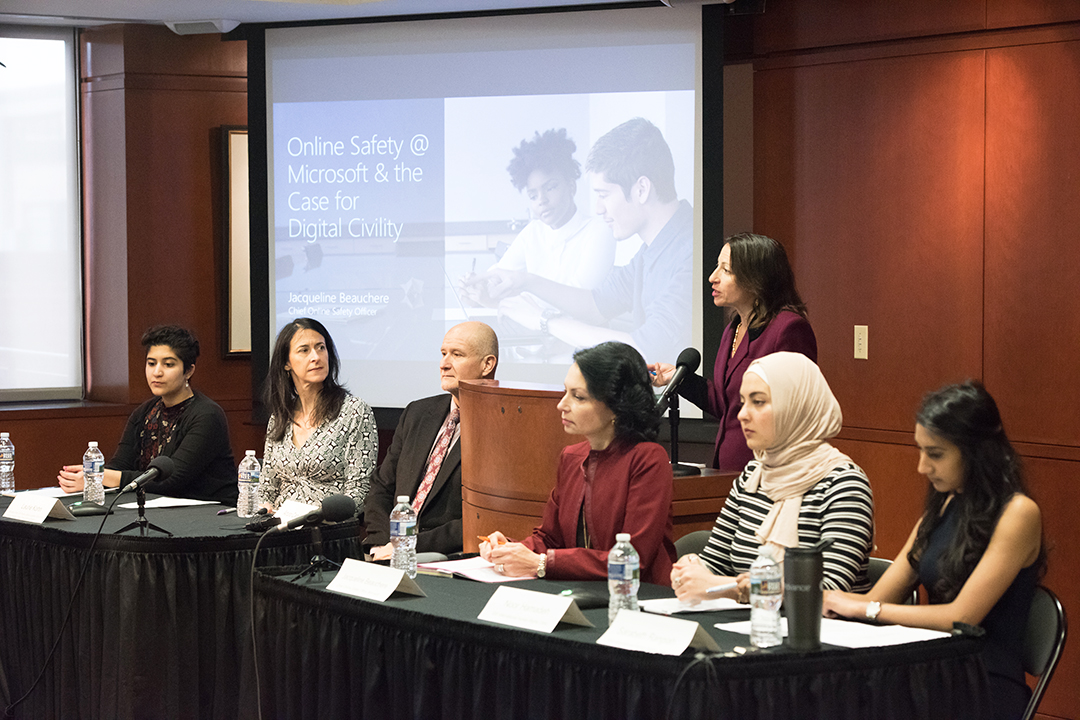The Global Internet Freedom & Human Rights Project held a conference, "A More Perfect Internet: Addressing Digital Incivility, Cyber-Violence, and 'Fake News,'" on current issues surrounding the use of the internet. The event consisted of two panel presentations.
The first panel, "Promoting Digital Civility and Combating Cyber-Violence," welcomed Jacqueline Beauchere, the Chief Online Safety Officer at Microsoft. Ms. Beauchere is responsible for all aspects of Microsoft's online safety strategy, including cross-company policy creation and implementation, and influence over consumer safety features. Professor Arturo J. Carrillo moderated the discussion.
Ms. Beauchere began by discussing Microsoft's findings on its global study on civility, safety, and online interactions. The study was conducted in 14 countries, and data was collected from teenagers (ages 13-17) and adults. She discussed the methodology and details of how the research was conducted. The purpose of the study aimed to gauge attitudes and perceptions on the incidence, frequency, and level of worry about digital world risks. Key highlights from the research found that 50 percent reported being "extremely or very" worried about life online; and 62 percent said they did not know or were unsure where to get help when they encountered an online risk. "We want people to get behind this notion of the need for digital civility – the need for being more respectful and exercising a certain level of decorum online," Ms. Beauchere said.
The next presentation featured Laurie S. Kohn, Director of the GW Family Justice Litigation Clinic and Co-Director of the Cyber-Violence Project, along with 3Ls Sarabeth Rangiah and Noor Hamadeh, students of the GW International Human Rights Clinic. Ms. Rangiah and Ms. Hamadeh spoke about the work of the Cyber-Violence Project, which offers legal services to victims of cyber-violence. They discussed the cyber-violence education curriculum for young people, which aims to "pull the plug" on the issue. They presented three modules: the first defined cyber-violence, the second listed the steps involved in seeking protection from cyber-violence, and the third went over how one should respond to it. Final remarks were given by 2L Fatimah Hameed, a student of the GW Family Justice Litigation Clinic, who spoke about the benefits, challenges, and the judicial training involved with CPO (Civil Protection Order) litigation.
The second panel, "Addressing the 'Fake News' Problem: Combating Online Hoaxes and Misinformation," focused on the problem of misinformation within the digital space. Panelists included Emma Llansó, Director of the Center for Democracy and Technology's Free Expression Project; Professor Matt Hindman, George Washington University Professor from the School of Media and Public Affairs; and Professor David Lazer, Northeastern University Professor of Political Science and Computer and Information Science. Professor Dawn C. Nunziato served as the moderator. Professor Lazer began the discussion by defining fake news; he then provided examples of how fake news is distributed and explained which communication channels are used. He also spoke about who is responsible for the distribution of that misinformation. Professor Hindman provided a historical perspective on the issue of fake news and how it is interpreted today. Concluding remarks came from Ms. Llansó, who discussed the legal remedies and regulations to address the problem of fake news.


